Drive down to Camp Lunagadh (no clue why they named it that) with a brief stopover at Negi's for some solid omelettes and butter-toast. The mountains make you seriously hungry, and you can eat completely guilt-free... at higher altitudes, a normal adult male burns an average of 10,000 calories doing what he would on the plains for 2,500. We weren't that high - I'm guessing the height needs to be at least 4,000 m to have that effect - but 3,000 m should be at least worth 5,000 calories. Yay! More toast!
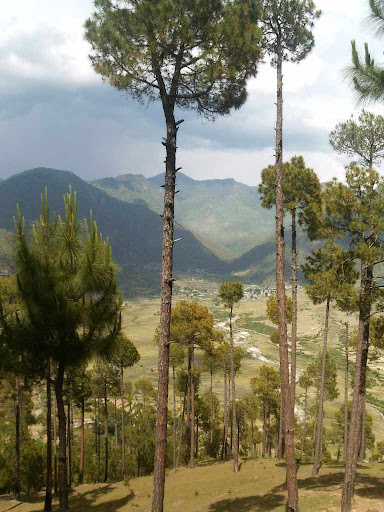 Naturally, as the roads got windier and steeper, the passengers got sicker. If the same thing ever happens to you, here's a good cure - pick up a couple of lemons, and salt. Slice in half, coat with salt, and suck. You'll definitely enjoy the ride, and trust me, if you're in the mountains, you cannot afford to not enjoy the ride. Criminal waste.
Naturally, as the roads got windier and steeper, the passengers got sicker. If the same thing ever happens to you, here's a good cure - pick up a couple of lemons, and salt. Slice in half, coat with salt, and suck. You'll definitely enjoy the ride, and trust me, if you're in the mountains, you cannot afford to not enjoy the ride. Criminal waste.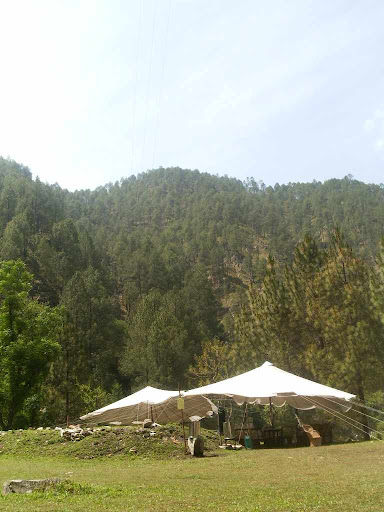 Reach camp by 3, and it's a little slice of heaven on Earth. A row of tents, two parachutes strung up to make a large covered area, the kitchen, and a frame holding up the rafts and kayaks in the center. Off to the side, there's the Tons river, and on the other 3 sides, green hillside. The air's cold, sharp and crystal clean. Dead silence. C takes one look, draws a single deep breath, and makes the first of many classic comments to come.
Reach camp by 3, and it's a little slice of heaven on Earth. A row of tents, two parachutes strung up to make a large covered area, the kitchen, and a frame holding up the rafts and kayaks in the center. Off to the side, there's the Tons river, and on the other 3 sides, green hillside. The air's cold, sharp and crystal clean. Dead silence. C takes one look, draws a single deep breath, and makes the first of many classic comments to come.C's Classic Comment #1: I just want to slip in piss.
 The arrival is a bit more interesting because a sudden mountain gale had whipped up a few minutes ago, and flattened all the tents; the guys were fixing it up when we arrived. There's a slight drizzle, and a cool, cold breeze. Rj and D realize that they're going to need slightly warmer clothing than the shorts and tees; this is what happens when you read newspapers that say Rishikesh is 34 degrees. This is not Rishikesh. This is as different from Rishikesh as anything you can imagine. This is what people look for when they go to Rishikesh, and unfortunately find Rishikesh instead, with it's stalls, heat, dust, and Dilli da Mundas out for a holiday.
The arrival is a bit more interesting because a sudden mountain gale had whipped up a few minutes ago, and flattened all the tents; the guys were fixing it up when we arrived. There's a slight drizzle, and a cool, cold breeze. Rj and D realize that they're going to need slightly warmer clothing than the shorts and tees; this is what happens when you read newspapers that say Rishikesh is 34 degrees. This is not Rishikesh. This is as different from Rishikesh as anything you can imagine. This is what people look for when they go to Rishikesh, and unfortunately find Rishikesh instead, with it's stalls, heat, dust, and Dilli da Mundas out for a holiday.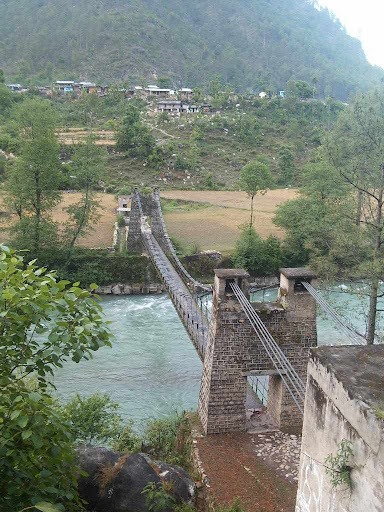 Meet up with Kieran, the camp director, a New Zealander who's spent the last couple of years just travelling and rafting; Brooke and Jenny, more rafters from the US; Bishnu and Tenzing from Nepal, and Rocky from Korea.
Meet up with Kieran, the camp director, a New Zealander who's spent the last couple of years just travelling and rafting; Brooke and Jenny, more rafters from the US; Bishnu and Tenzing from Nepal, and Rocky from Korea.We head off to Mori village to pick up some essential supplies; I need cigs and batteries, Rj and D need sweaters, R needs a cap and C needs desi daru.
We stop at a small shack by the side of the road where C and Tenzing head up and try to buy some of the local stuff, called 'roxy'. C encounters a problem with these 2 names - he refuses to believe that Tenzing is actually called Tenzing, and thinks we're making fun of him, and insists on calling him 'boss', 'brother', and 'sir'. Roxy is a bigger problem; he keeps asking the girls at the shack what it's called. The girls giggle for a while, then one suddenly straightens up, assumes an extremely deadpan, all-business voice and face and says
"Daru."
C looks pained and comes back.
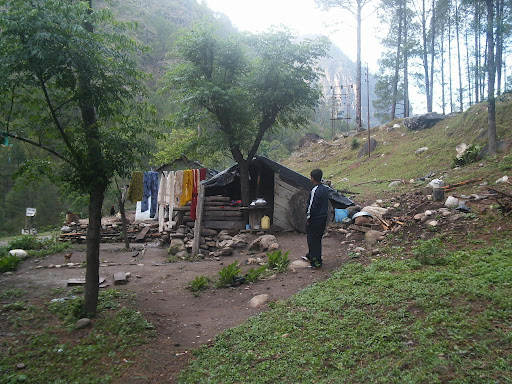 Back at the camp, in the middle of complete emptiness with just the sound of the river and a slight breeze, we watch the stars, light a campfire, and feast on absolutely amazing mutton curry. You have to hand it to these guys; when A recommended Aqua Terra, he said, "They'll take good care of you... good place, good people, and really good food." I'm beginning to see why. And I think I'm going to enjoy myself for the next few days.
Back at the camp, in the middle of complete emptiness with just the sound of the river and a slight breeze, we watch the stars, light a campfire, and feast on absolutely amazing mutton curry. You have to hand it to these guys; when A recommended Aqua Terra, he said, "They'll take good care of you... good place, good people, and really good food." I'm beginning to see why. And I think I'm going to enjoy myself for the next few days.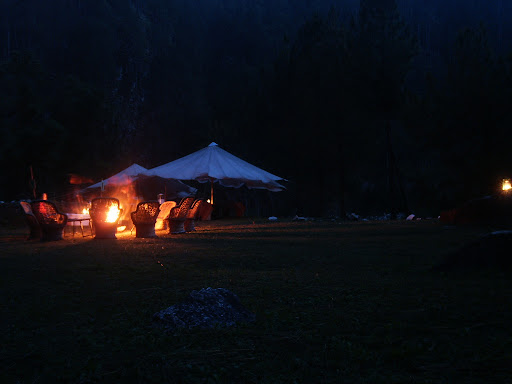 In R's tent, we find a giant spider that has her perched rigidly on the edge of the bed with a deathly face, watching it. We shoo it off and go to sleep. The camp was the most quiet, peaceful place I've ever been in; there's no electricity, just lanterns and starlight; no cellular network, so no client calls or boss calls; just the gently rustle of the wind in the trees, the flow of the river, and the occasional bleat of a faraway sheep to break the stillness.
In R's tent, we find a giant spider that has her perched rigidly on the edge of the bed with a deathly face, watching it. We shoo it off and go to sleep. The camp was the most quiet, peaceful place I've ever been in; there's no electricity, just lanterns and starlight; no cellular network, so no client calls or boss calls; just the gently rustle of the wind in the trees, the flow of the river, and the occasional bleat of a faraway sheep to break the stillness.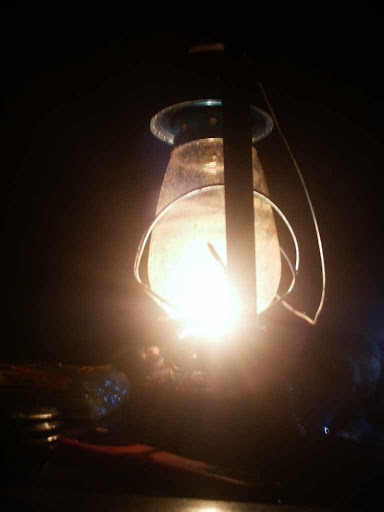
Early next morning, a walk. We passed an encampment of the one of the Gujjar tribes, a group of hill nomads who roam around with their herds of cows, buffaloes and goats, a lifestyle that hasn't changed for several thousand years now. The clothes are modern, and the tents are plastic sheeting... but to all purposes, they've ignored time.
 The roads are completely empty and quiet; the only sound, the birds. And our breathing, and footsteps. Remember the last time you were aware of the sound of your own footsteps during the day?
The roads are completely empty and quiet; the only sound, the birds. And our breathing, and footsteps. Remember the last time you were aware of the sound of your own footsteps during the day?
 Breakfast, excellent again. Then pile into the car and a truck with the raft and the rafters, and head off upstream for a couple of km past Mori to start rafting.
Breakfast, excellent again. Then pile into the car and a truck with the raft and the rafters, and head off upstream for a couple of km past Mori to start rafting.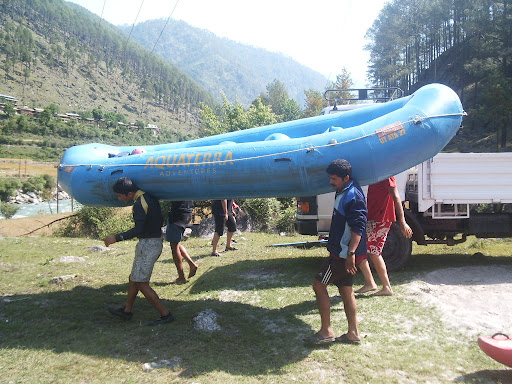
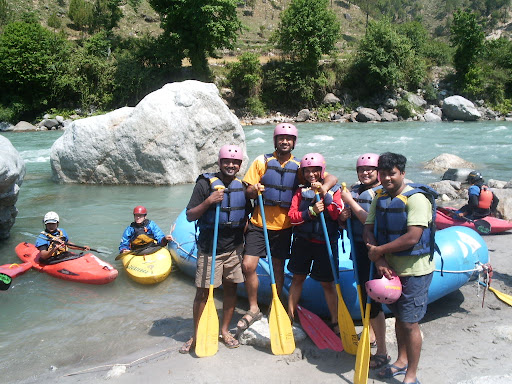 Rafting's an intense experience. When you start, there's the excitement, trepidation, and slight stomach-knots (none of us except C had done this before) while standing in the warm sun, putting on the life-jackets and helmets, and listening to the do's and don't's from Kieran. The fact that most of these consisted of what to do when you fall out, or capsize, or get stuck underwater, or hit a rock, or hit another kayaker, or panic and grab a kayaker, in which case he is perfectly justified in whacking us with the paddle, doesn't really add to confidence levels. It's generally pretty fun, and easy, if you have a good guide. And definitely a has-to-be-done, at-least-once experience.
Rafting's an intense experience. When you start, there's the excitement, trepidation, and slight stomach-knots (none of us except C had done this before) while standing in the warm sun, putting on the life-jackets and helmets, and listening to the do's and don't's from Kieran. The fact that most of these consisted of what to do when you fall out, or capsize, or get stuck underwater, or hit a rock, or hit another kayaker, or panic and grab a kayaker, in which case he is perfectly justified in whacking us with the paddle, doesn't really add to confidence levels. It's generally pretty fun, and easy, if you have a good guide. And definitely a has-to-be-done, at-least-once experience.Then you get in, and float out to a brief calm area where you get familiar with the strokes and emergency response. Then, before you know it, the current catches you and throws you across the first rapid, called Wake Up! and the first splash of icy water douses your sun-warmed body like a hysterical shriek just behind you in the middle of a quiet dark night, and you're off and running. The next few hours are alternating periods of extreme screaming excitement and cold wet splashes, and you get chucked around, cold and wet, like an auto on the Jogeshwari-Vikhroli Link Raod during the monsoons. Then there are periods of sunny calm between rapids where you float along, while Kieran recounts rafting stories and tells jokes that give you a slightly unreal feeling, because most of them exist in an alternate universe of grass-smoking, high-IQ animals. I spent three years in their company while I was at Presidency college, so I related instantly.
Mr. Monkey is sitting up in a tree, rolling up a joint. From below, he hears a voice - "Hey Mr. Monkey! What are you doing up there?" It's Mr. Monkey's best friend, Mr. Lizard.
"Well," says Mr. Monkey, "I'm just rolling meself a nice joint, Mr. Lizard. Would you like to come up and join me?"
"Don't mind if I do, Mr. Monkey, don't mind at all," Says Mr. Lizard, and up he comes, sits with Mr. Monkey, and they light up.
After around an hour, and several joints later, Mr. Lizard says, "Mr. Monkey, appreciating your company and all, but I do have a wicked thirst. Do you mind if I head off for a drink?"
"Not at all, Mr. Lizard," says Mr. Monkey. "In fact, the stream's just round the corner. I'll roll the last one and wait for you till you get back."
So off goes Mr. Lizard, and Mr. Monkey starts rolling the last joint. This one's the great-grandaddy of all joints, the Godzilla, a joint the size of a baseball bat and twice the size of Mr. Monkey. So he rolls it, and sits, and waits. And waits. And waits some more.
"Where is Mr. Lizard," he thinks finally, "I'm going to light up, I'm sure he'll be back before a minute," and lights up.
A minute passes, then two, then ten. Mr. Monkey (and the joint) are going strong, feeling good and relaxed. "Damn, where is he," wonders Mr. Monkey. "I hope he'll be back soon, this joint's really good stuff..."
So Mr. Monkey puffs, and puffs. Minutes pass by, and still no Mr. Lizard. The joint gets over by a quarter, then a third, then half. Mr. Monkey is flying really high now, zoned out.
Suddenly, there's a rustling in the bushes, and along come Mr. Monkey's other best friend, Mr. Crocodile.
"Say Mr. Monkey!" cries Mr. Crocodile. "What're you doing up there?"
"Holy FUCK!" cries Mr. Monkey, looking down. "How much water did you fuckin drink?!"
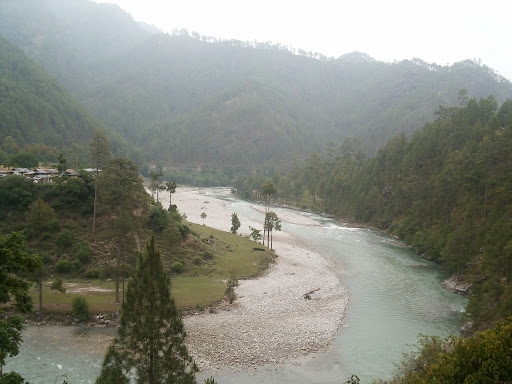 And with this, our raft hits a rock, gets stuck, and tilts over at forty-five degrees, nearly depositing us all in the drink, while the Tons desperately tries to continue it's way by pouring fifty buckets of ice-cold water per second onto us. Kieran has to get off the raft, stand on the rock, and push us off.
And with this, our raft hits a rock, gets stuck, and tilts over at forty-five degrees, nearly depositing us all in the drink, while the Tons desperately tries to continue it's way by pouring fifty buckets of ice-cold water per second onto us. Kieran has to get off the raft, stand on the rock, and push us off.Rafting's about more than just a sense of adventure. You get to - in fact, you have to - do the equivalent of a Ph.D in practical hydrodynamics. Kayaking is even more so - from the bottom up, in a sense. You're not just seeing it happen; you're in it. So how fast you can recognize flows, eddies, waves, and 'holes' - where the water crests a rock, falls in a rapid, and creates a circular wave that keeps endlessly collapsing on itself - is crucial to your survival. Kieran himself sported a egg-sized lump above his eye where he had landed on an underwater rock earlier yesterday. There are times when you need to paddle to keep moving, and there are times when you need to hold onto the safety line around, and there are times when (usually when going over a 'hole') - you need to get your head down and hold on for dear life. And if you're in the middle, this is complicated more by the fact that the person in front of you will usually end up sitting on your head.
River flows are measured in cumix (cubic meters of water, i.e. 1 ton of water, per second) by rafters. The Ganga at Rishikesh is around 150 cumix. The Tons was 40, and a grade 3+ classified river. Which is good fun for first-timers, exciting but also fairly safe... but like they say, there are no guarantees.
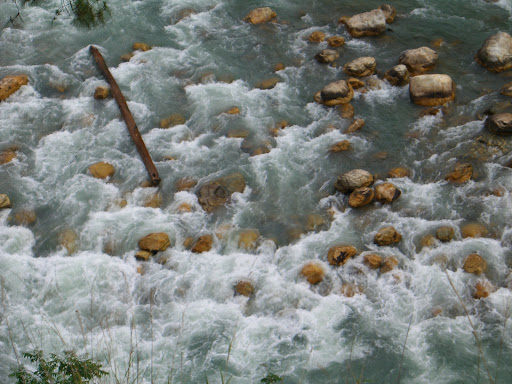 At around this point, R dropped her paddle and shrieked like a lost soul until it floated back to her 5 minutes later, while C the enthu cutlet paddled away in spite of all instructions to the contrary. We had been seeing kids along the banks regularly, watching us like some interesting entertainment, and now we looked up and saw a pair of wires strung across the river. This is a popular means of crossing; rather than use the bridge, 5 km down the river, locals would just sling a hook into the downsloped wire and slide across. It's called a Tyrolean Traverse. There was a kid hanging off it just above our heads, waving cheerfully to us as we floated past. Kieran's instant response was to enthusiastically try and splash him, from which he (the kid) skidded off like lightning but we in the raft ended up with a round a pint or two down our necks.
At around this point, R dropped her paddle and shrieked like a lost soul until it floated back to her 5 minutes later, while C the enthu cutlet paddled away in spite of all instructions to the contrary. We had been seeing kids along the banks regularly, watching us like some interesting entertainment, and now we looked up and saw a pair of wires strung across the river. This is a popular means of crossing; rather than use the bridge, 5 km down the river, locals would just sling a hook into the downsloped wire and slide across. It's called a Tyrolean Traverse. There was a kid hanging off it just above our heads, waving cheerfully to us as we floated past. Kieran's instant response was to enthusiastically try and splash him, from which he (the kid) skidded off like lightning but we in the raft ended up with a round a pint or two down our necks.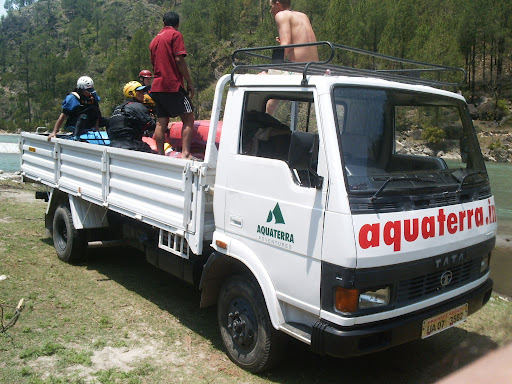 After the first trip, we headed back for camp, ate another solid lunch, and dozed off for an hour or two, or sat snoozing or reading in the sun. Peace, defined. The Perfect Mountain Relaxation. These guys had a bunch of timepass magazines, some books, and trekking guides, very thoroughly dog-eared with frequent reading. That's the way guides should be; so thoroughly used, with notes, stories, bookmarks, scribbles, stains, and scars, that you can respect the book like you would a scarred veteran in the army. It's been places and seen things, far more than you.
After the first trip, we headed back for camp, ate another solid lunch, and dozed off for an hour or two, or sat snoozing or reading in the sun. Peace, defined. The Perfect Mountain Relaxation. These guys had a bunch of timepass magazines, some books, and trekking guides, very thoroughly dog-eared with frequent reading. That's the way guides should be; so thoroughly used, with notes, stories, bookmarks, scribbles, stains, and scars, that you can respect the book like you would a scarred veteran in the army. It's been places and seen things, far more than you.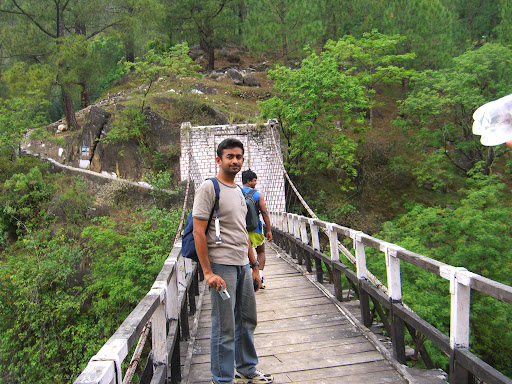 Later in the afternoon, we headed off to Sandra bridge for a trek in the evening. Walked through a couple of villages, then along a irrigation gully, before hitting the proper hiking trail, which continues for another 4-5 km to Mora. It was enthusiastically promoted by Kieran and Brooke as, literally, a walk in the park; so naturally D got quite horrified at the fact that we had to climb mountains, scramble through undergrowth, hop over fallen trees, and scramble across rockfalls.
Later in the afternoon, we headed off to Sandra bridge for a trek in the evening. Walked through a couple of villages, then along a irrigation gully, before hitting the proper hiking trail, which continues for another 4-5 km to Mora. It was enthusiastically promoted by Kieran and Brooke as, literally, a walk in the park; so naturally D got quite horrified at the fact that we had to climb mountains, scramble through undergrowth, hop over fallen trees, and scramble across rockfalls.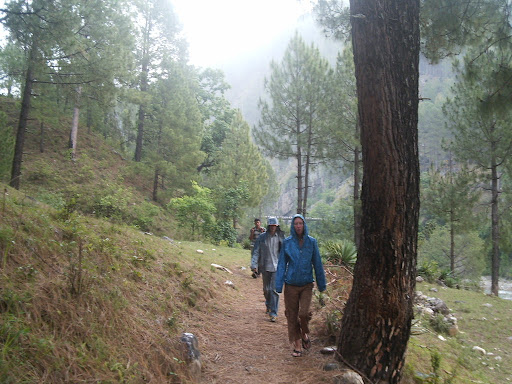 The rain was an equally mischievous imp accomapying us, waiting for the really tricky bits before pelting down, and instantly stopping the minute we all got our jackets on. Finally C, our designated forest-guide-in-training, clad in a pair of fluorescent green Goan shorts, gave up and decided to walk in the rain. The rain then obliged him by drizzling consistently all the way back to camp.
The rain was an equally mischievous imp accomapying us, waiting for the really tricky bits before pelting down, and instantly stopping the minute we all got our jackets on. Finally C, our designated forest-guide-in-training, clad in a pair of fluorescent green Goan shorts, gave up and decided to walk in the rain. The rain then obliged him by drizzling consistently all the way back to camp.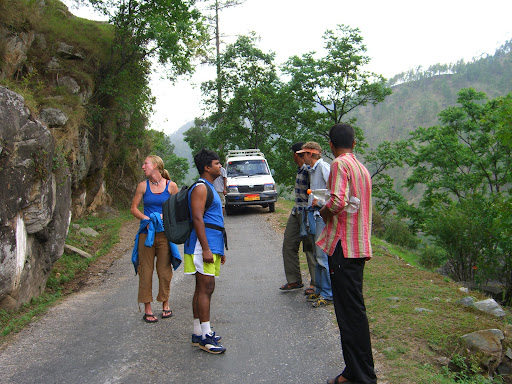 Another interesting feature was the weeds growing wildly all over the place. Check it out. Another reason to settle in the Himalayas.
Another interesting feature was the weeds growing wildly all over the place. Check it out. Another reason to settle in the Himalayas.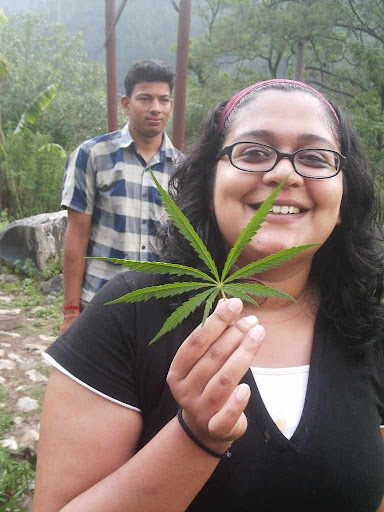 Reached back damp and shivering in the icy breeze, then changed and wrapped up warmly and had hot chai and the last cigarette of the trip. Ahhh. Bliss.
Reached back damp and shivering in the icy breeze, then changed and wrapped up warmly and had hot chai and the last cigarette of the trip. Ahhh. Bliss.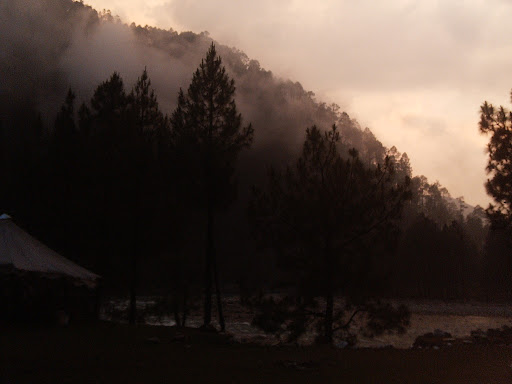 The next day, we head off rafting again. Brilliantly bright sunshiny day, perfect weather. Which should have warned us, but we were too happy in the moment to care. Kieran served up another set of animal stories in the first calm patch...
The next day, we head off rafting again. Brilliantly bright sunshiny day, perfect weather. Which should have warned us, but we were too happy in the moment to care. Kieran served up another set of animal stories in the first calm patch...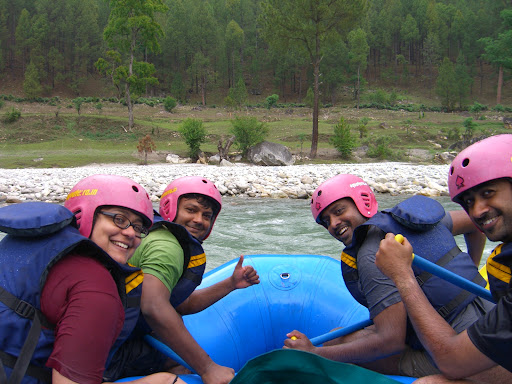 A young polar bear cub, with his elderly polar bear granddad, is sitting besides a hole in the ice, learning how to fish for baby seals. All around is a clear white expanse of snow and ice, lit by a feeble sun, disturbed by occasional drifting eddies of snow and ice in the polar wind.
A young polar bear cub, with his elderly polar bear granddad, is sitting besides a hole in the ice, learning how to fish for baby seals. All around is a clear white expanse of snow and ice, lit by a feeble sun, disturbed by occasional drifting eddies of snow and ice in the polar wind."Grandad," asks Junior suddenly, "Can I ask you a question? And will you tell the truth?"
"Sure, Junior," says grandad. "What is it?"
"Well," says the cub, "Am I really a Polar Bear? I mean, all polar bear? A hundred percent?"
"Of course you are!" cries granddad. "A very good one too!"
Some time passes. No seals appear, and the two of them continue to watch the hole.
"Are you sure, granddad?" says Junior again. "There's no bit of, say, Grizzly Bear in me?"
"Of course not! You're all Polar!" tells granddad.
Some more time goes by, and it gets colder.
"How about... Black Bear? Am I even a little Black Bear?" asks Junior suddenly.
"Definitely not!" cries granddad, wondering what's up. "Why?"
Never mind," says the cub. "What about... um, Panda Bear?"
"Hm, well, I've never been anywhere near China, and your mother's parents... no, no, definitely no Panda Bear. For sure."
"How about... Koala Bear?"
"Junior will you tell me what's going on?!" cries the aged grandparent, now completely fed up. "What's with all this questioning about what kind of Bear you are? Don't you know you're a Polar Bear?"
"Well, Granddad," says Junior, "If I'm really a full, 100%, unadulterated, true-blue Polar Bear... Why the fuck am I freezing my balls off?"
Exactly on cue, the sun went behind a cloud, a low, moaning sound came through the mountains, and the wind began to pick up speed. There was a distant roll of thunder, and a slight drizzle pattered down. The water went instantly from being the gentle friendly refresher it had been moments ago to an evil, brooding, vicious beast, swirling, churning, and sucking us along. In another few minutes, the moaning of the wind became a howl, and the drizzle turned into a horizontal strafe of ice-cold needles of rain slicing into your skin with deadly efficiency. Himalayan storms come up with breathtaking speed, and they're merciless.
We were stuck now, because the current and the wind were in opposite directions; as the current pulled us forward, the wind blew us back. And we couldn't even get to the shore. We paddled till our arms burned attached to frozen, unfeeling clenched fists around the oars, while the rest of our bodies froze into rigid numb postures, eyes slitted against the rain, breathing in icy water vapor. Finally we made the edge, leapt ashore, and huddled in the trees around another rafting camp while Kieran secured the raft.
 R had been in the back of the raft today, usually the most dangerous and exciting place, because that gets pitched around the most - so C came up with yet another classic comment.
R had been in the back of the raft today, usually the most dangerous and exciting place, because that gets pitched around the most - so C came up with yet another classic comment.C's Classic Comment # 2 - "So, R. Tell me. Did you like it in the back?"
At this, all of us laughed hysterically like hyenas at a Jim Carrey film festival while C put on a very pained expression and tried to explain the context in which he had meant it.
We had to walk back quite a bit of the way because the wind had knocked down a couple of pines, and the road was blocked. Pines fall down quite a bit around here, because the locals drain out sap from the trunks to make resin; this weakens the trunk to the point it becomes hollow and dry, and the first strong wind knocks it over. That's what happened finally to the tallest tree in Asia, which fell over that same morning.

 Warmed up at the camp, then after lunch, drove down to the Hanol village, to the temple of Mahasu Devta, in Tiuni. There's a couple of stone balls in the courtyard, and visitors can prove the strength of their devotion through the strength of their arms. Anyone who can pick up both balls, one after another, to his shoulder and throw them down, will have his desires granted. One ball weighs 80 kilos, the other is a hundred plus.
Warmed up at the camp, then after lunch, drove down to the Hanol village, to the temple of Mahasu Devta, in Tiuni. There's a couple of stone balls in the courtyard, and visitors can prove the strength of their devotion through the strength of their arms. Anyone who can pick up both balls, one after another, to his shoulder and throw them down, will have his desires granted. One ball weighs 80 kilos, the other is a hundred plus.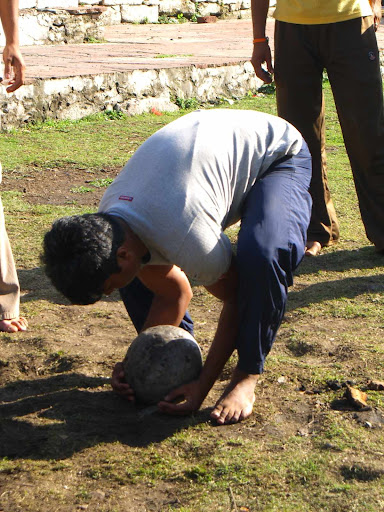 It's all about technique; you have to roll it up in stages along your body. Strength alone can't do it. I saw huge beefy guys struggle to get it off the ground while scrawny little mountain folk would saunter down, effortlessly roll it up, to shoulder, around back of the neck, over the other shoulder, and casually drop it off. C also tried, but couldn't get the technique right; Kieran got the smaller ball up after four tires, but, as before, the bigger one eluded him. He's been trying for the last three years, and he swears it's going happen one day. The villagers, naturally, were vastly entertained and cheered him on enthusiastically.
It's all about technique; you have to roll it up in stages along your body. Strength alone can't do it. I saw huge beefy guys struggle to get it off the ground while scrawny little mountain folk would saunter down, effortlessly roll it up, to shoulder, around back of the neck, over the other shoulder, and casually drop it off. C also tried, but couldn't get the technique right; Kieran got the smaller ball up after four tires, but, as before, the bigger one eluded him. He's been trying for the last three years, and he swears it's going happen one day. The villagers, naturally, were vastly entertained and cheered him on enthusiastically. We went into the Puja, and the next thing we know we're stuck inside packed in like a Virar local in a small, smoky room while a Pandit performs the rites in the antechamber. Women weren't allowed inside, so R waited outside; there she came across a couple of goat being slaughtered for the sacrifice, and came away from the Hanol trip feeling sick, and more than a little mentally disturbed.
We went into the Puja, and the next thing we know we're stuck inside packed in like a Virar local in a small, smoky room while a Pandit performs the rites in the antechamber. Women weren't allowed inside, so R waited outside; there she came across a couple of goat being slaughtered for the sacrifice, and came away from the Hanol trip feeling sick, and more than a little mentally disturbed. But that's as much a part of this place, and the mountains, as the sunshine and the clean air, as much a part of it like the greenery and the escape from your usual life. The reason everything is the way it is, is because it's not part of the city life. There's a wildness in the mountains, a savagery. You live not just on physical edges of precipices; Life itself, your existence, is close to the Other Side. It's a thin line, and every day is a gift; a Life that can end very quickly and sharply at any time. No mercy, no pity from Nature up here. You survive if you're capable of it. Laws and customs - as we know them - may not make sense here; it has it's own rules, and a beauty both dark as well as light.
But that's as much a part of this place, and the mountains, as the sunshine and the clean air, as much a part of it like the greenery and the escape from your usual life. The reason everything is the way it is, is because it's not part of the city life. There's a wildness in the mountains, a savagery. You live not just on physical edges of precipices; Life itself, your existence, is close to the Other Side. It's a thin line, and every day is a gift; a Life that can end very quickly and sharply at any time. No mercy, no pity from Nature up here. You survive if you're capable of it. Laws and customs - as we know them - may not make sense here; it has it's own rules, and a beauty both dark as well as light.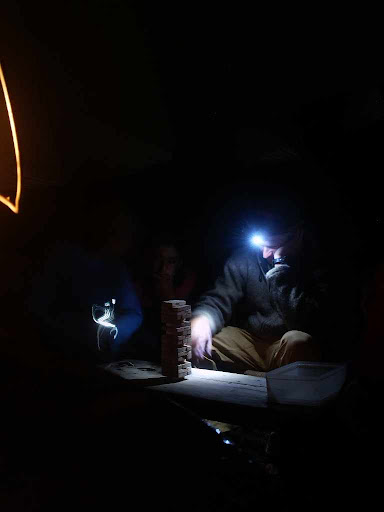 Later that evening, I played a little baddy with R and C, then a little Jenga (a game where you have to keep building an increasingly taller and more unstable tower of wooden blocks in turns last person to execute a successful move without a collapse is the winner) by the light of Petzel headlamps, and finally we settled down around the fire and chatted until really late night with Brooke, John, and Jennifer. It was our last night at camp, and everyone generally chilled out a lot more. Brooke produced a bottle of whisky, and we sat around in the firelight, talking about Hindi songs (John sang, of all things, Zeest's bhenchod sutta), Bollywood, Utah, Paris Hilton, Cosmo, rafting, travel, waves, holes, flips, eddies, eskimo rolls (turning completely upside-down in a kayak underwater and back again), how to speak in Hindi (which included some esential abuses every first-time visitor to India needs to know; these guys had already picked up a fairly good collection) and other such stuff.
Later that evening, I played a little baddy with R and C, then a little Jenga (a game where you have to keep building an increasingly taller and more unstable tower of wooden blocks in turns last person to execute a successful move without a collapse is the winner) by the light of Petzel headlamps, and finally we settled down around the fire and chatted until really late night with Brooke, John, and Jennifer. It was our last night at camp, and everyone generally chilled out a lot more. Brooke produced a bottle of whisky, and we sat around in the firelight, talking about Hindi songs (John sang, of all things, Zeest's bhenchod sutta), Bollywood, Utah, Paris Hilton, Cosmo, rafting, travel, waves, holes, flips, eddies, eskimo rolls (turning completely upside-down in a kayak underwater and back again), how to speak in Hindi (which included some esential abuses every first-time visitor to India needs to know; these guys had already picked up a fairly good collection) and other such stuff.Classic Comment # 3: John: "Aage badho. Madar-chodon."

 Kieran told us about the jade pendant he always wears, which R had completely fallen in love with. It was a pounamu, a traditional Maori amulet in nephrite jade. They come in different forms, and each signifies something different. Kieran's was a Manaia, a spiritual guardian, and protector. Pounamu have their own magical and spiritual force; there are clear rules governing their use. A pounamu can never be made for oneself, but only received as a gift. If you carve one and wear it yourself, it will drain you of your mana, sucking out your soul and leaving you spiritually empty, a dry, dead husk. You must carve a pounamu with the qualities that you want to gift to someone, wear it for a while to infuse it with some of your own life-force, and then gift it so that same life-force flows back into the receiver. In the truest sense, it's a gift of self, a part of your life-force, your soul, that becomes a part of someone else's.
Kieran told us about the jade pendant he always wears, which R had completely fallen in love with. It was a pounamu, a traditional Maori amulet in nephrite jade. They come in different forms, and each signifies something different. Kieran's was a Manaia, a spiritual guardian, and protector. Pounamu have their own magical and spiritual force; there are clear rules governing their use. A pounamu can never be made for oneself, but only received as a gift. If you carve one and wear it yourself, it will drain you of your mana, sucking out your soul and leaving you spiritually empty, a dry, dead husk. You must carve a pounamu with the qualities that you want to gift to someone, wear it for a while to infuse it with some of your own life-force, and then gift it so that same life-force flows back into the receiver. In the truest sense, it's a gift of self, a part of your life-force, your soul, that becomes a part of someone else's.It makes you wonder, doesn't it... how many other such things there are in our lives all around us, that drain out our souls every day, and we don't even know about them?
 Then it was time to leave, the next morning, and we said our goodbyes, packed our bags, piled into the car and headed off. We were very quiet for a while... there was a sense of loss, a sense that we had seen and experienced something rare, something wonderful, and now were leaving it forever.
Then it was time to leave, the next morning, and we said our goodbyes, packed our bags, piled into the car and headed off. We were very quiet for a while... there was a sense of loss, a sense that we had seen and experienced something rare, something wonderful, and now were leaving it forever. We stopped at Purola on the way back, for some snacks, and then everyone dozed off while I watched the mountains fly by. Look at any mountain landscape as you would a still frame in a film; then speed up geological time, visualize the centuries passing like seconds, and the drama of geology is seen. Melting mountains, pushed upwards while erosion crackles the dirt out of solid rock; dirt like water, flowing off the slopes in gullies and collecting as a vast pool in the valleys; and water like lasers, slicing away the dirt into silt, down to the plains.
We stopped at Purola on the way back, for some snacks, and then everyone dozed off while I watched the mountains fly by. Look at any mountain landscape as you would a still frame in a film; then speed up geological time, visualize the centuries passing like seconds, and the drama of geology is seen. Melting mountains, pushed upwards while erosion crackles the dirt out of solid rock; dirt like water, flowing off the slopes in gullies and collecting as a vast pool in the valleys; and water like lasers, slicing away the dirt into silt, down to the plains.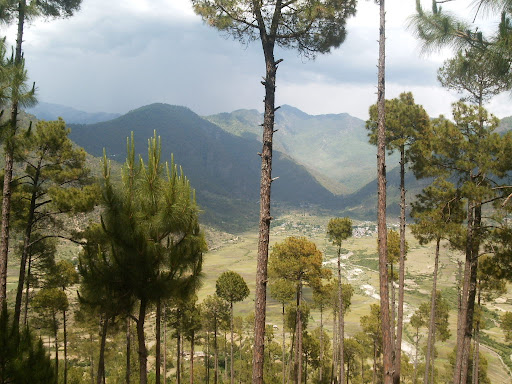 This has been an eye-opener. I feel different. Something's been changed, up there, in the silent openness.
This has been an eye-opener. I feel different. Something's been changed, up there, in the silent openness.Every time I go to the mountains, I leave a little bit of my soul behind. One day, when I die, all of my spirit will, hopefully, be a part of them.
And I bring something back, too... a little peace, a little determination, a little bit more refusal to accept the living hell that an urban landscape is, these days.
And, of course, plans for the next trip.

Tons River Rafting Camp - See the photos here.
4 comments:
as i always said....life is the Himalayas and himalayas is my life....so i understand u completely. u can never be the same once u r there. Ya...next trip soon :-)
bips
hey, i was looking for someone who's done the Tons Valley camp with Aquaterra. How does it compare to rafting on the Ganges near Rishikesh? Is it more adventurous?
Hello, Life
As an experience, Aquaterra is miles ahead of the standard Rishikesh rafting.
Rishikesh tends to be short-term, day-trip type experiences; the Aquaterra one is a week-long dedicated camp, where you stay in the camp far away from the city. They take care of food, stay, and rafting. No electricity or phones.
Rishikesh is also more crowded, noisier and hotter, but also cheaper and more flexible if you plan to do several other things in the area. Do this if you have just 1-2 days, but it's nowhere near the Aquaterra experience.
PS - Rishikesh tends to be grade 2 at best. Tons river at Mori is grade 2-3.5, so yes, definitely more adventurous and exciting. The safety guides and instructors are also more experienced and entertaining.
Post a Comment